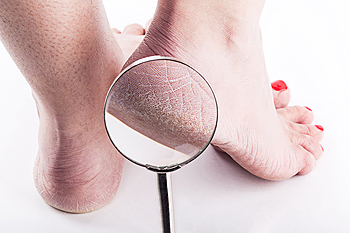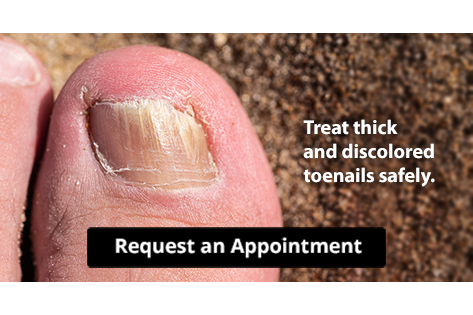Blog
Items filtered by date: June 2023
A Lack of Vitamins May Cause Cracked Heels

Many people have the foot condition that is known as cracked heels. Various reasons, including vitamin deficiency, can cause this ailment. A lack of vitamin E can affect the skin and cause it to dry. Good sources of this vital nutrient can include sunflower seeds, salmon, avocado, and various oils. Additionally, patients who do not have adequate amounts of vitamin B-3 may develop a condition called pellagra. This can cause the skin to become dry and scaly, affecting the heels. Sources of this vitamin can consist of brown rice, lentils, poultry, and seafood. Existing medical conditions may also lead to developing cracked heels, such as eczema and athlete’s foot. Cracked heels can be prominent among people who frequently walk barefoot and may be prevented when sandals or shoes are worn. If you have cracked heels, it is suggested that you schedule an appointment with a podiatrist who can guide you toward the treatment routine that is correct for you.
Cracked heels are unsightly and can cause further damage to your shoes and feet. If you have any concerns, contact David Lambarski, DPM from Northeast Foot Care. Our doctor can provide the care you need to keep you pain-free and on your feet.
Cracked Heels
Cracked heels appear unappealing and can make it harder for you walk around in sandals. Aside from looking unpleasant, cracked heels can also tear stockings, socks, and wear out your shoes. There are several methods to help restore a cracked heel and prevent further damage.
How Do You Get Them?
Dry skin is the number one culprit in creating cracked heels. Many athletes, walkers, joggers, and even swimmers suffer from cracked heels. Age and skin oil production play a role to getting cracked heels as well.
Promote Healing
Over the counter medicines can help, especially for those that need instant relief or who suffer from chronic dry feet.
Wear Socks – Wearing socks with medicated creams helps lock in moisture.
Moisturizers – Applying both day and night will help alleviate dryness which causes cracking.
Pumice Stones – These exfoliate and remove dead skin, which allows for smoother moisturizer application and better absorption into the skin.
Change in Diet
Eating healthy with a well-balanced diet will give the skin a fresh and radiant look. Your body responds to the kinds of food you ingest. Omega-3 fatty acids and zinc supplements can also revitalize skin tissue.
Most importantly, seek professional help if unsure how to proceed in treating cracked heels. A podiatrist will help you with any questions or information needed.
If you have any questions, please feel free to contact our offices located in Amsterdam and Clifton Park, NY . We offer the newest diagnostic and treatment technologies for all your foot care needs.
Who Is Prone to Getting Plantar Fasciitis?

An inflammatory foot condition that commonly affects the heel may be plantar fasciitis. The plantar fascia is found on the sole of the foot and connects the heel to the toes. Overusing the foot or enduring an injury can cause this tendon to become torn or irritated, and plantar fasciitis may result. This condition can cause severe pain and discomfort, and it is often difficult to walk. The heel and lower back of the leg are affected by plantar fasciitis, and the pain may be worse in the morning after sleeping. Plantar fasciitis may be more prevalent among older people. The fat pad in the heel may not absorb as much shock as it once did and can become thinner. The additional shock may damage the plantar fascia, and the heel may become swollen and bruised. Additionally, people who are overweight, have diabetes, or have flat feet may be more susceptible to developing plantar fasciitis. Stretching the heel and calves may provide mild relief. This can be done by standing on a step while lowering the heel one at a time until a gentle stretch is felt. If you have heel pain, it is strongly suggested that you visit a podiatrist who can effectively diagnose and treat plantar fasciitis.
Plantar fasciitis can be very painful and inconvenient. If you are experiencing heel pain or symptoms of plantar fasciitis, contact David Lambarski, DPM from Northeast Foot Care. Our doctor can provide the care you need to keep you pain-free and on your feet.
What Is Plantar Fasciitis?
Plantar fasciitis is the inflammation of the thick band of tissue that runs along the bottom of your foot, known as the plantar fascia, and causes mild to severe heel pain.
What Causes Plantar Fasciitis?
- Excessive running
- Non-supportive shoes
- Overpronation
- Repeated stretching and tearing of the plantar fascia
How Can It Be Treated?
- Conservative measures – anti-inflammatories, ice packs, stretching exercises, physical therapy, orthotic devices
- Shockwave therapy – sound waves are sent to the affected area to facilitate healing and are usually used for chronic cases of plantar fasciitis
- Surgery – usually only used as a last resort when all else fails. The plantar fascia can be surgically detached from the heel
While very treatable, plantar fasciitis is definitely not something that should be ignored. Especially in severe cases, speaking to your doctor right away is highly recommended to avoid complications and severe heel pain. Your podiatrist can work with you to provide the appropriate treatment options tailored to your condition.
If you have any questions please feel free to contact our offices located in Amsterdam and Clifton Park, NY . We offer the newest diagnostic and treatment technologies for all your foot and ankle needs.

